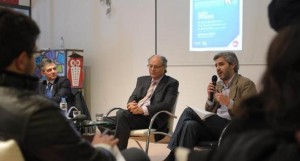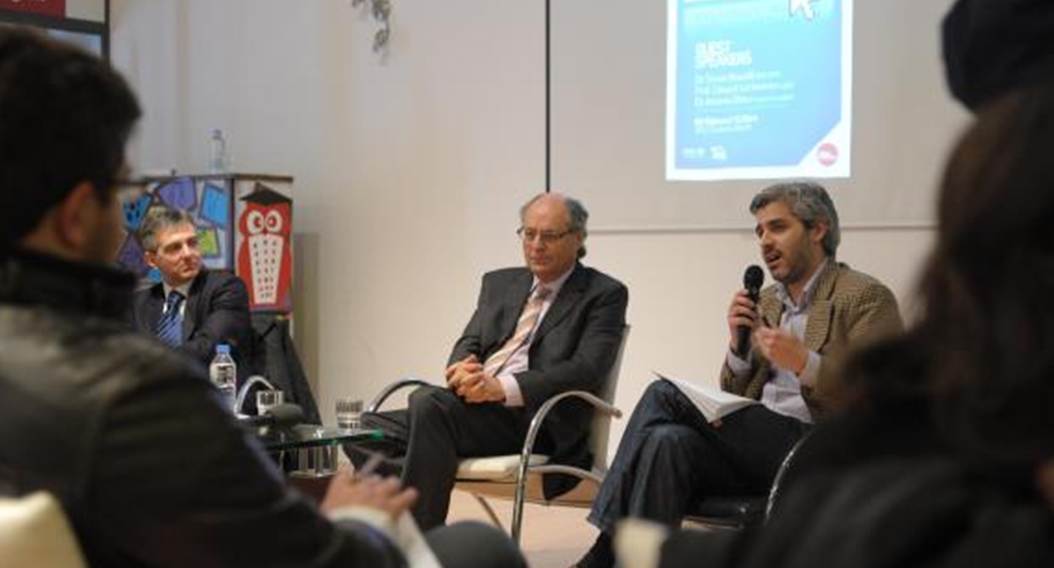Acta, the anti-counterfeiting trade agreement was the subject of a well-attended KSU debate at the University.
Dr Busuttil said he was positively inclined to Acta because it aimed to strengthen enforcement in the fight against counterfeit and piracy. EU countries including Malta already have strong legislation on these two issues but this agreement sought to focus on the enforcement aspect.
“In principle I cannot object to it because I am in favour of the fight against counterfeit and piracy because itius illegal and because there are thousands of people in Malta who are working for Maltese companies producing goods or software who could be victims of false products. Their job is at risk everyday because of counterfeit and pirate products.
People were looking at Acta in a negative way because of the impression they got that it will restrict internet use and freedoms. But the downloading of films or music is already illegal. He noted that the EP has not yet voted on the matter but will vote on it probably in June.
In the meantime there was space for debate.

“Although in principle I am not against it I am open to what people have to say about it. If the negatives outweigh the positives I am willing to vote against,” Dr Busuttil said.
Edward Scicluna appealed to students not to try and understand the details of Acta but rather to see who the players behind it are.
“Crime prevention and policing comes at a cost because it interferes with our freedoms. I am not in favour of economic crime but one has to balance the cost of interference with civil liberties.
The European Socialist Party was suspicious of this agreement from the outset and there was a healthy dose of scepticism.
Prof. Scicluna said he was against Acta because he did not want people to rummage through his luggage to see if he had any counterfeit products. This was one of the provisions of Acta.
But lawyer Antonio Ghio, who specialises in intellectual property rights, said the clause regarding travellers personal luggage was preceded by the word may not should because crossing a border with a counterfeit bag was different to crossing a border with a container of counterfeit bags. This strengthened the fact that personal privacy would not be violated
He said Acta was trying to achieve a level of harmonisation with respect to enforcement of intellectual property rights and tried to reach a consensus of how these rights could be protected.
“The myth that it will restrict freedom of expression or that Acta will turn internet users into criminals and ISPs into policemen is all rubbish,” he said adding that most of the provisions of Acta were already part of Maltese laws.
The big question that should be answered, he said, was why Malta and other countries were signing the agreement if it was already covered in their laws.
He drew a parallel to the Convention of Human Rights and said that similarly Malta had subscribed to convention even though its contents were already enshrined in its laws.
Asked about the lack of transparency behind the agreement, Dr Busuttil admitted that it was not completely transparent because negotiations had been underway since 2008 or earlier.
These were always held behind closed doors but this does not mean that the whole process was not transparent. There was a draft agreement in 2008 and another draft agreement in 2010. This has been in the public domain since 2010 but it did not hit the media so people did not know about it. He said there was an element of secrecy about Acta but it was now before MPs who had the final say. If they said no, Acta would be dead. He also said that it was not clear yet whether this had to be approved by all EU countries for it to come into effect.
Prof. Scicluna said people had to beware of big industries who were pushing for this agreement. He mentioned as an example the tobacco industry and the impact this had on civil society and the pharmaceutical industry.
Big industries were going to protect their properties but this should not be done at the cost of interfering with civil liberties. He also said that downloading a film illegally did not mean that the police would come knocking at one’s door to arrest him but the agreement would target people providing this service for economic gain.
Prof. Scicluna will be attending the protest against Acta on Saturday.
– thetimesofmalta, February 8, 2012
—
At a debate organised by the University Student Council (KSU) this afternoon, IT Expert, Lawyer and Lecturer at the University of Malta, Antonio Ghio and Nationalist MEP Simon Busuttil aligned themselves with the pro-ACTA camp and Labour MEP Edward Scicluna took a more sceptic approach and declared he would be marching alongside the public protest organised by the Malta Anti-ACTA Group this Saturday in Valletta.
During the debate which was attended by around 100 students, Simon Busuttil rebutted claims by the anti-ACTA camp that the process which led to the drafting of the act was not transparent and democratic. Whilst admitting that the process could have been more open, Busuttil said “There is no secrecy at all and the text is available for all to read and discuss. Today’s debate is a sign of transparency and I am ready to listen to civil society about this matter.”
Busuttil added that if the anti-ACTA campaigners convince him that he should vote against the act he will have no qualms to do so. However he said that “I will vote for the protection of hundreds of jobs which are currently threatened by counterfeit products.” Busuttil added that he “does not owe anything to big businesses but he will vote to ensure that jobs are protected”. The MEP said that if the European Parliament will vote against ACTA, the act will be “dead”.
On the other hand Labour MEP Edward Scicluna said agreements “should never be signed behind closed doors” and added that it is not yet clear what affect the act will have on the acquis communautaire. Scicluna said that people “should not accept agreements that are the result of underhand dealings of big corporations”. He said citizens have ecery right to be suspicious and sceptical and that is why he will join the anti-ACTA protest on Saturday.
Scicluna said big businesses were right in affirming their rights and profits however this should not come “at the expense of interfering with civil liberties.” He added that at present national law already covers illegal counterfeit products which infiltrate the market. Scicluna said that he will “never vote for something which intrudes on personal liberties”.
Antonio Ghio, who came under fire from anti-ACTA students present at the debate, spent most of the debate defending the act and explaining that ACTA “does not change any existing national laws on piracy and counterfeit products”. He argued that many people are confusing ACTA with another legislation, SOPA, which has now been put on the backburner by the US Congress after a huge public outcry against this legislation.
Ghio explained that with ACTA the citizens’ online experience will not be altered in any way. “Whoever downloads a file is already infringing national law and ACTA will not change it. It will not turn infringers into criminals but it will strengthen legislation against commercial counterfeit products”. Ghio said anti-ACTA campaigns on Facebook and other social networks are misinformed as they were “probably confusing ACTA with SOPA or referring to the original version of ACTA which has been softened and amended by the European Commission”.
Other points of contention at the University debate were the language used in the act’s text which anti-ACTA activists said was “vague” and the role of the ACTA committee which activists claim will have powers to amend the act, bypassing democratic processes. Busuttil and Ghio refuted these accusations and said that the ACTA committee, which will be comprise all signatory countries, will have no power at all to amend the act.
– maltatoday, February 8, 2012
— video —

40 responses to “Acta debate taken to University”
mexican rx online: mexico pharmacy – mexican online pharmacies prescription drugs
mexican pharmaceuticals online
https://cmqpharma.com/# п»їbest mexican online pharmacies
reputable mexican pharmacies online
You have remarked very interesting details! ps decent web site.Raise range
canada drugs reviews [url=https://canadapharmast.online/#]77 canadian pharmacy[/url] precription drugs from canada
https://indiapharmast.com/# buy prescription drugs from india
canadian pharmacy meds: canadian pharmacy ltd – canadian pharmacy king reviews
drugs from canada [url=https://canadapharmast.online/#]canadian pharmacy no scripts[/url] canada online pharmacy
http://foruspharma.com/# mexico drug stores pharmacies
canadian pharmacy meds: best canadian online pharmacy – canadian pharmacy 24
top 10 pharmacies in india: india pharmacy – indian pharmacy online
india online pharmacy [url=https://indiapharmast.com/#]india online pharmacy[/url] indian pharmacy
canadian pharmacy: buy canadian drugs – real canadian pharmacy
canadapharmacyonline legit: canadian pharmacy victoza – my canadian pharmacy rx
http://foruspharma.com/# mexico pharmacies prescription drugs
mexican pharmaceuticals online: п»їbest mexican online pharmacies – mexico drug stores pharmacies
buying prescription drugs in mexico [url=http://foruspharma.com/#]medicine in mexico pharmacies[/url] purple pharmacy mexico price list
mexico pharmacy: mexican mail order pharmacies – mexico drug stores pharmacies
buy doxycycline tablets: buy doxycycline capsules – no prescription doxycycline
http://doxycyclinedelivery.pro/# oral doxycycline
buy cipro online canada [url=http://ciprodelivery.pro/#]ciprofloxacin 500mg buy online[/url] ciprofloxacin mail online
https://amoxildelivery.pro/# amoxicillin for sale
https://paxloviddelivery.pro/# paxlovid pharmacy
doxycycline cheap uk [url=http://doxycyclinedelivery.pro/#]doxycycline 600 mg[/url] doxycycline 1000mg best buy
http://amoxildelivery.pro/# buy amoxicillin online without prescription
can you get generic clomid pills: can i buy generic clomid without insurance – where to buy generic clomid without insurance
doxyciclin: buy doxycycline hyclate 100mg without a rx – buy doxycycline 100 mg tablet
https://clomiddelivery.pro/# where buy cheap clomid without dr prescription
http://amoxildelivery.pro/# amoxacillian without a percription
generic amoxicillin 500mg [url=http://amoxildelivery.pro/#]amoxicillin without a prescription[/url] amoxicillin over counter
https://doxycyclinedelivery.pro/# doxycycline 100 mg cap over the counter
can i buy amoxicillin online: where can you get amoxicillin – amoxicillin online pharmacy
https://paxloviddelivery.pro/# paxlovid pharmacy
doxycycline 50 medicine [url=https://doxycyclinedelivery.pro/#]doxycycline 2985[/url] doxycycline 400 mg daily
https://amoxildelivery.pro/# amoxicillin generic
https://ciprodelivery.pro/# buy cipro online without prescription
doxycycline tablets buy online [url=https://doxycyclinedelivery.pro/#]buy doxycycline no prescription[/url] order doxycycline online
https://amoxildelivery.pro/# where to get amoxicillin over the counter
doxycycline 100mg capsules price in india: cost of doxycycline in canada – doxycycline order online uk
http://doxycyclinedelivery.pro/# how much is doxycycline cost
paxlovid pill [url=https://paxloviddelivery.pro/#]п»їpaxlovid[/url] Paxlovid over the counter
http://amoxildelivery.pro/# order amoxicillin online uk
buy cipro without rx: ciprofloxacin generic price – where to buy cipro online
http://paxloviddelivery.pro/# п»їpaxlovid
http://doxycyclinedelivery.pro/# doxycycline prices canada
pharmacy prices for doxycycline [url=https://doxycyclinedelivery.pro/#]doxycycline cost canada[/url] doxycycline 100 capsules
get cheap clomid without rx: how to get generic clomid pill – buying generic clomid no prescription
doxycycline medication: cheap doxy – doxycycline online pharmacy uk